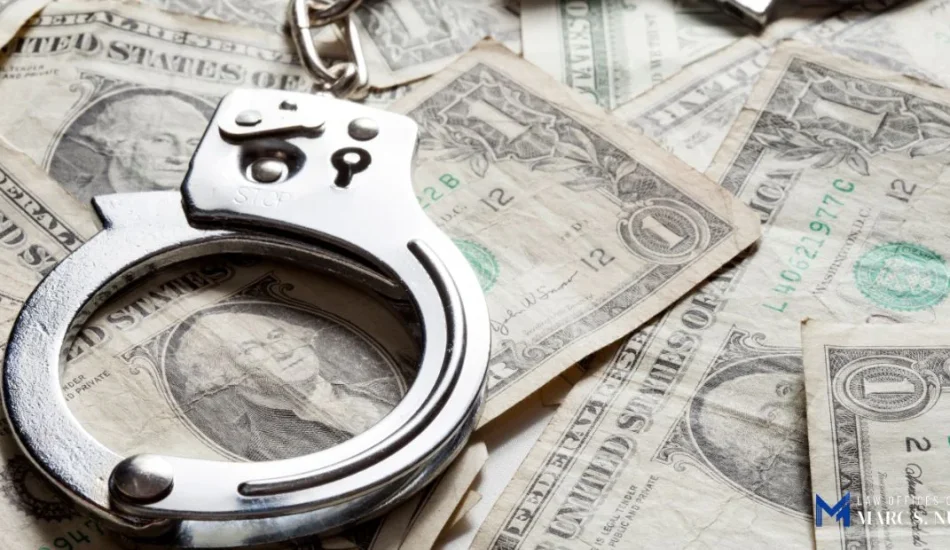Call Us Nationwide310-909-6828

The term “white-collar” crime was first coined by the FBI in 1939 to refer to nonviolent criminal acts that use business transactions to defraud victims. The line between a legitimate business and something criminal in nature can become blurred when investors lose money and assume the worst of someone they once trusted. Anyone who engages in business should understand the basics of this class of crimes. So, what is considered a white-collar crime in California?
There are many kinds of white-collar crimes that can be prosecuted in California. As the name suggests, white-collar crimes tend to be committed by people in the business and finance field. Unlike violent crimes that use fear and violence to compel victims to submit to the will of perpetrators, white-collar crimes often use traditional means of business, albeit for nefarious ends.
If you were recently charged with committing a white-collar crime, you could seek the legal services of a white-collar defense attorney who is experienced in representing defendants who have been accused of laundering money or another white-collar crime.
Although many people associate white-collar crime with lax criminal penalties, white-collar crimes can lead to life-altering consequences for defendants. The mere accusation that someone laundered money or defrauded investors can ruin the defendant’s reputation. Anyone convicted of a white-collar crime faces steep fines, potential jail time, and court orders to compensate victims for their losses.
White-collar crimes are complicated and require the work of a defense attorney who can counter the narratives of prosecutors who may not fully understand the crime they are investigating. One reason white-collar crimes are rarely prosecuted is because of the complexity of crimes that often involve numerous financial transactions that may involve complex financial instruments.
Losing investor money or making an honest mistake is not a crime, but prosecutors may be unduly focused on the criminal nature of a business transaction when there is no criminal intent involved. Your white-collar lawyer’s job is to get your side of the story. Any evidence that can be called into question weakens the prosecution’s case. With the right legal representation, the state’s case against you may weaken or fall apart altogether.
Even when prosecutors move forward with criminal charges, an attorney can work to negotiate lower charges or penalties. Sometimes, taking a favorable plea bargain offer is preferable to going to trial. At all times, your lawyer will counsel you on which options offer the optimal means of resolving your case so you can move on with life.
A: White-collar crime is an umbrella term that refers to nonviolent crimes that defraud people of assets and property under the guise of legitimate business transactions. White-collar crimes often take place in offices and places of business. To prove a crime took place, prosecutors often have to prove intent as well as prove that the defendant caused the criminal offense.
A: The criminal charge you face for a white-collar crime depends on the type and severity of the crime you commit. Some crimes are misdemeanors when they only involve theft of several hundred dollars, while felonies typically involve the misappropriation of tens of thousands of dollars or more. Dependents who have a criminal record or committed an aggravating offense by targeting a vulnerable population may be more likely to face felony charges.
A: White-collar crimes are hard to prosecute because financial crimes are inherently complex. The front-end research and investigation that has to be done just to see if a crime was committed requires considerable resources that many law enforcement agencies may not have. This is especially true at the city or county level. Even when there appears to be enough evidence to bring criminal charges, proving intent adds another barrier for prosecutors and investigators.
A: The three most common white-collar crimes are fraud, embezzlement, and money laundering. Fraud could include securities fraud, insurance fraud, and mortgage fraud. All are deceptive practices that secure an unfair and unlawful gain. Embezzlement is when someone misappropriates funds for personal use. Money laundering is concealing the origin of illegally obtained money. This is often done through the use of domestic and foreign banks.
Being charged with a crime does not mean you are guilty. The burden is on prosecutors to prove beyond a reasonable doubt that you committed a crime and that you intended to commit a crime. Sometimes, business deals go bad, and law enforcement jumps to conclusions. With the right attorney representing your interests, you can get your side of the story across.
A white-collar lawyer from the Law Offices of Marc S. Nurik can guide you through the details of your case, help you understand your charges, and work to develop a legal strategy that can settle your case on favorable terms. Contact our legal team today to get started.
4800 N. Federal Highway Suite 205B
Boca Raton, FL 33431
9350 Wilshire Blvd Suite 308
Beverly Hills, CA 90212